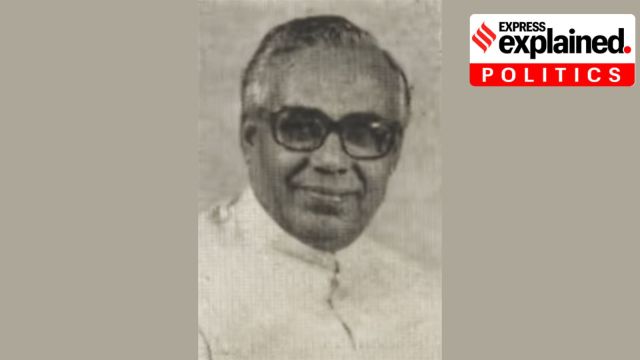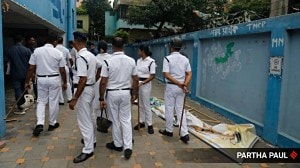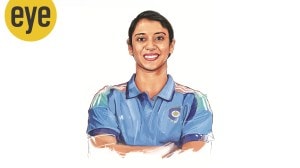Shyamlal Yadav is one of the pioneers of the effective use of RTI for investigative reporting. He is a member of the Investigative Team. His reporting on polluted rivers, foreign travel of public servants, MPs appointing relatives as assistants, fake journals, LIC’s lapsed policies, Honorary doctorates conferred to politicians and officials, Bank officials putting their own money into Jan Dhan accounts and more has made a huge impact. He is member of the International Consortium of Investigative Journalists (ICIJ). He has been part of global investigations like Paradise Papers, Fincen Files, Pandora Papers, Uber Files and Hidden Treasures. After his investigation in March 2023 the Metropolitan Museum of Art, New York returned 16 antiquities to India. Besides investigative work, he keeps writing on social and political issues. ... Read More
Bihar Chief Ministers | Bhagwat Jha Azad: Brief stint in CM’s chair undone by dissidents
With the Assembly elections underway in the state, this is the eighteenth part of a new series on the chief ministers of Bihar, from Shri Krishna Sinha to Nitish Kumar
 Azad was a seasoned politician, but his selection highlighted the evolving "unanimous" method of choosing Congress Legislative Party (CLP) leaders, which began under Indira Gandhi's influence. (Wikimedia Commons)
Azad was a seasoned politician, but his selection highlighted the evolving "unanimous" method of choosing Congress Legislative Party (CLP) leaders, which began under Indira Gandhi's influence. (Wikimedia Commons)Bihar boasts of one of the most fascinating political histories in India. With Assembly polls underway in the state, The Indian Express brings a series of articles that tell the history of Bihar politics through the tenure of its 23 chief ministers. This article tells the story of Bhagwat Jha Azad, Bihar’s 18th CM. You can click here to read about his predecessor, Bindeshwari Dubey. The next edition will focus on his successor, Satyendra Narain Sinha.
When the Congress high command decided to replace Bindeshwari Dubey as chief minister, several names emerged as probable successors: Assembly Speaker Shiv Chandra Jha, veteran MP and former Union minister Bhagwat Jha Azad, ex-Chief Minister Jagannath Mishra, controversial former Union minister KK Tewary, and Governor Bhishma Narain Singh. The party, however, preferred to retain a Brahmin chief minister to balance caste equations, especially since neighbouring Uttar Pradesh had a Rajput CM in Bir Bahadur Singh. Though there were many contenders, Bhagwat Jha Azad, then Lok Sabha MP from Bhagalpur, ultimately emerged victorious.
Azad was a seasoned politician, but his selection highlighted the evolving “unanimous” method of choosing Congress Legislative Party (CLP) leaders, which began under Indira Gandhi’s influence.
Only 85 of the 240 legislators (MLAs and MLCs) attended the late-night meeting on 13 February 1988, where Azad was declared elected unanimously. Central observers included Finance Minister Narain Dutt Tiwari, former Union minister B. Shankaranand, and AICC General Secretary (Bihar in-charge) Naresh Chandra Chaturvedi. Azad took his oath as chief minister the following day.
Although the Congress had secured a majority in the 1985 assembly elections, Azad had already become the second CM to be appointed after that victory, after Bindeshwari Dubey. He too would go on to face intense dissidence amid deep factionalism within Congress (I).
***
The Azad government started well. Within a few months of being sworn in, the chief minister requested the central government to launch Income Tax raids on some ruling party leaders and their associates. On 2 October 1988, Gandhi Jayanti, Azad announced in Patna his intention to implement land reforms, a longstanding Congress promise dating back to pre-independence days that had been repeated in nearly every state election. It appeared he would continue as chief minister, at least until the general election in late 1989 and the assembly elections in early 1990.
He announced that land reforms would be carried out over the following three months, redistributing nearly one lakh acres of surplus land from large landowners amongst the weaker sections of society. This drew criticism from his opponents, many of whom were landlords themselves.
Over the next three months, he worked to control a campaign against his government from opponents within the party.
In October, ex-Deputy CM Ram Jaipal Singh Yadav launched a signature campaign against Azad, holding multiple meetings with legislators to plan his ouster. Over 100 MLAs signed a complaint against the chief minister, which was sent to the Prime Minister in late 1988, followed by a delegation led by Yadav to New Delhi.
The crisis deepened, and in January 1989, Rajiv Gandhi sent Central ministers from Bihar—Bindeshwari Dubey, LP Shahi, Krishna Shahi, KK Tiwari, Rafique Alam and AICC(I) Treasurer Sitaram Kesari—to Patna to negotiate with the dissidents. Two ministers resigned and joined the rebels. However, since Azad had been selected by Rajiv Gandhi himself, and similar dissidence was occurring in other states, the party high command decided against removing him. After the central team returned from Patna in January 1989, it was clarified that there would be no change, though this later proved not to be the party’s final decision.
By February 1989, the situation had deteriorated sharply amid a weakening party organisation, where discipline was ignored and infighting was being played out publicly. Under pressure in an election year, Prime Minister Rajiv Gandhi summoned Jagannath Mishra and Satyendra Narain Sinha to New Delhi on 22 February. Rumours spread that Sinha would replace Azad. After three weeks, this rumour became reality: the change was formalised and Sinha took over on March 11, 1989.
***
Azad had never contested state assembly elections; his career was rooted in the Lok Sabha. He first won in 1952 from the dual-member Purnea-cum-Santal Parganas seat. He lost in 1957 from Dumka and in 1977 from Bhagalpur, but represented Bhagalpur in every other Lok Sabha term until 1984. When Indira Gandhi became Congress president in 1959, Azad served as her secretary. Upon becoming the chief minister, he entered the Legislative Council, remaining there until May 1994. Azad passed away in October 2010.
Azad’s political legacy endures through his sons. Kirti Azad, a cricketer-turned-politician, is a Lok Sabha MP from the Trinamool Congress representing Bardhaman (West Bengal). His other son, Rajvardhan Azad, is a nominated member of the Legislative Council.
Next – Satyendra Narain Sinha



- 01
- 02
- 03
- 04
- 05




































